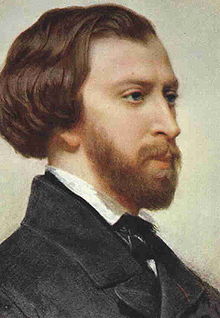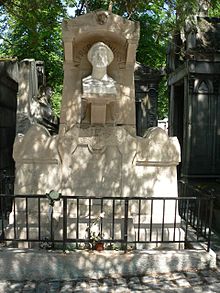- Alfred de Musset
-
Alfred Louis Charles de Musset-Pathay[1] (11 December 1810 – 2 May 1857) was a French dramatist, poet, and novelist.[1][2] Along with his poetry, he is known for writing La Confession d'un enfant du siècle (The Confession of a Child of the Century, autobiographical) from 1836.[2]
Contents
Biography
French literature By category French literary history French writers Chronological list
Writers by category
Novelists · Playwrights
Poets · Essayists
Short story writersPortals France · Literature Musset[1] was born on 11 December 1810 in Paris.[2] His family was upper-class but poor and his father worked in various key government positions, but never gave his son any money. His mother was similarly accomplished, and her role as a society hostess, - for example her drawing-room parties, luncheons, and dinners, held in the Musset residence - left a lasting impression on young Alfred.[2]
Early indications of Musset's boyhood talents were seen by his fondness for acting impromptu mini-plays based upon episodes from old romance stories he had read.[2] Years later, elder brother Paul de Musset would preserve these, and many other details, for posterity, in a biography on his famous younger brother.[2]
Alfred de Musset entered the collège Henri-IV at the age of nine, where in 1827 he won the Latin essay prize in the Concours général. With the help of Paul Foucher, Victor Hugo's brother-in-law, he began to attend, at the age of 17, the Cénacle, the literary salon of Charles Nodier at the Bibliothèque de l'Arsenal. After attempts at careers in medicine (which he gave up owing to a distaste for dissections), law,[1] drawing, English and piano, he became one of the first Romantic writers, with his first collection of poems, Contes d'Espagne et d'Italie (1829, Tales of Spain and Italy).[1] By the time he reached the age of 20, his rising literary fame was already accompanied by a sulphurous reputation fed by his dandy side.
He was the librarian of the French Ministry of the Interior under the July Monarchy. During this time he also involved himself in polemics during the Rhine crisis of 1840, caused by the French prime minister Adolphe Thiers, who as Minister of the Interior had been Musset's superior. Thiers had demanded that France should own the left bank of the Rhine (described as France's "natural boundary"), as it had under Napoleon, despite the territory's German population. These demands were rejected by German songs and poems, including Nikolaus Becker's Rheinlied, which contained the verse: "Sie sollen ihn nicht haben, den freien, deutschen Rhein ..." (They shall not have it, the free, German Rhine). Musset answered to this with a poem of his own: "Nous l'avons eu, votre Rhin allemand" (We've had it, your German Rhine).
The tale of his celebrated love affair with George Sand,[1] which lasted from 1833 to 1835, is told from his point of view in his autobiographical novel, La Confession d'un Enfant du Siècle (The Confession of a Child of the Century,[1] made into a film, Children of the Century), and from her point of view in her Elle et lui. Musset's Nuits (1835–1837, Nights) trace his emotional upheaval of his love for George Sand, from early despair to final resignation.[1] He is also believed to be the author of Gamiani, or Two Nights of Excess (1833), a lesbian erotic novel, also believed to be modeled on George Sand.[3]
Musset was dismissed from his post as librarian by the new minister Ledru-Rollin after the revolution of 1848. He was however appointed librarian of the Ministry of Public Instruction in 1853.
Musset received the Légion d'honneur on 24 April 1845, at the same time as Balzac, and was elected to the Académie française in 1852 (after two failures to do so in 1848 and 1850).
Alfred de Musset died in his sleep on 2 May 1857. The cause was heart failure, the combination of alcoholism and a longstanding aortic insufficiency. One symptom that had been noticed by his brother was a bobbing of the head as a result of the amplification of the pulse; this was later called de Musset's sign.[4] He was buried in Père Lachaise Cemetery in Paris.
Reception
The French poet Arthur Rimbaud was highly critical of Musset's work. Rimbaud wrote in his Letters of a Seer (Lettres du Voyant) that Musset did not accomplish anything because he "closed his eyes" before the visions. (Lettre à Paul Demeny, mai 1871)
Director Jean Renoir's La règle du jeu was inspired by Musset's play, Les Caprices de Marianne.
Henri Gervex's 1878 painting Rolla was based on a poem by de Musset. It was rejected by the jury of the Salon de Paris for immorality, since it depicted a scene from the poem of a naked prostitute after having sex with her client - but the controversy helped Gervex's career.
Music
Lorenzaccio, which takes place in Medici's Florence, was set to music by the musician Sylvano Bussotti in 1972.
In 2007, Céline Dion recorded a song called "Lettre de George Sand à Alfred de Musset" for her album D'elles.
Works
Poetry
- Contes d'Espagne et d'Italie, 1829
- Un Spectacle dans un fauteuil, 1832
- Poésies complètes, 1840
- Poésies nouvelles, 1850
- Les Nuits (Nuits de mai, d'août, d'octobre, de décembre), 1835–1837
- Œuvres posthumes, 1860
Plays
- La Nuit vénitienne, 1830
- a failure; from this point until 1847, his plays were published but not performed
- André del Sarto, 1833
- Les Caprices de Marianne, 1833
- Lorenzaccio, 1833
- Fantasio, 1834
- On ne badine pas avec l'amour, 1834
- La Quenouille de Barberine, 1835
- Le Chandelier, 1835
- Il ne faut jurer de rien, 1836
- Un Caprice, 1837
- first performed in 1847, and a huge success, leading to the performance of other plays
- Il faut qu'une porte soit ouverte ou fermée, 1845
- On ne saurait penser à tout, 1849
- Carmosine, 1850
- Bettine, 1851
- L'Âne et le Ruisseau, 1855
Novels
- La Confession d'un enfant du siècle (The Confession of a Child of the Century, autobiographical), 1836.[2]
- Histoire d'un merle blanc (The White Blackbird), 1842.
Secondary Literature
- Henri Lefebvre, Musset, 1955
- Mimi Pinson
Notes
- ^ a b c d e f g h His names are often reversed "Louis Charles Alfred de Musset": see "(Louis Charles) Alfred de Musset" (bio), Biography.com, 2007, webpage: Bio9413.
- ^ a b c d e f g "Chessville - Alfred de Musset: Romantic Player", Robert T. Tuohey, Chessville.com, 2006, webpage: Chessville-deMusset.
- ^ Kendall-Davies, Barbara (2003). The Life and Work of Pauline Viardot Garcia. Cambridge Scholars Press. pp. 45–46. ISBN 1-904303-27-7. http://books.google.co.uk/books?id=zppg-I0Bw1UC&pg=PA46&d.
- ^ "Twelve eponymous signs of aortic regurgitation, one of which was named after a patient instead of a physician." The American Journal of Cardiology, Volume 93, Issue 10, 15 May 2004, Pages 1332-1333. By Tsung O. Cheng MD.
External links
- Works by Alfred de Musset at Project Gutenberg
- Sand and Musset at the Theater to Paris : "Sand et Musset, les Amants du siècle"
- The New Student's Reference Work/Musset, Alfred de
Preceded by
Emmanuel Mercier DupatySeat 10
Académie française
1852–1857Succeeded by
Victor de LapradeCategories:- 1810 births
- 1857 deaths
- Writers from Paris
- French dramatists and playwrights
- French novelists
- French nobility
- Members of the Académie française
- Romantic poets
- Chevaliers of the Légion d'honneur
- Burials at Père Lachaise Cemetery
- 19th-century theatre
- Lycée Henri-IV alumni
Wikimedia Foundation. 2010.


